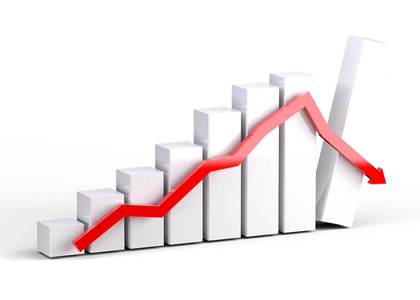7 of top ten largest firms lose Rs 1.36 lakh crore in last week
By IANS | Updated: August 10, 2025 16:44 IST2025-08-10T16:38:06+5:302025-08-10T16:44:55+5:30
Mumbai, Aug 10 Six of the top ten most valued firms in India lost Rs 1.361 lakh crore ...

7 of top ten largest firms lose Rs 1.36 lakh crore in last week
Mumbai, Aug 10 Six of the top ten most valued firms in India lost Rs 1.361 lakh crore in market capitalisation last week, with Reliance Industries suffering the biggest loss.
Markets fell for the sixth straight week following US President Donald Trump's unexpected announcement of a 50 per cent tariff on Indian goods. The Nifty and Sensex fell by nearly one per cent, closing at 24,363 and 79,857, respectively.
From the top ten firms in Nifty pack, Reliance Industries, HDFC Bank, Bharti Airtel, ICICI Bank, Infosys and Hindustan Unilever faced erosion in their market valuation.
The valuation of Reliance Industries dipped by Rs 34,710 crore to Rs 18,51,174 crore. HDFC Bank's market capitalisation tanked Rs 29,722 crore to Rs 15,14,303 crore.
The market value of ICICI Bank fell by Rs 24,719 crore to Rs 10,25,495 crore, and that of Infosys dropped by Rs 19,504 crore to Rs 5,91,423 crore.
The valuation of Bharti Airtel declined by Rs 15,053 crore to Rs 10,59,850 crore, and that of Hindustan Unilever by Rs 12,441.09 crore to Rs 5,87,021.88 crore.
Tata Consultancy Services (TCS), State Bank of India, Life Insurance Corporation of India (LIC) and Bajaj Finance gained in value.
However, the mcap of LIC jumped Rs 17,678 crore to Rs 5,77,188 crore. The valuation of TCS climbed Rs 11,361 crore to Rs 10,97,909 crore.
State Bank of India added Rs 9,784 crore, taking its valuation to Rs 7,42,649 crore, and that of Bajaj Finance went up by Rs 186 crore to Rs 5,45,148 crore.
Broader indices underperformed benchmark indices with BSE midcap index falling 1 per cent and BSE smallcap index falling 2 per cent.
On the sectoral front, domestic demand-driven segments such as infrastructure, select autos, and rural-focused FMCG may display relative resilience if macro conditions hold steady, analysts said.
Disclaimer: This post has been auto-published from an agency feed without any modifications to the text and has not been reviewed by an editor
Open in app